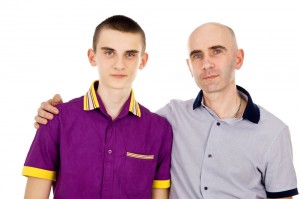
The sexual abuse of children is a worldwide problem that has lasting and sometimes lifelong impacts on the child, their family and the community.
There is a substantial amount of research that now demonstrates the long term impacts of child sexual abuse which includes:
- The increased incidence of all types of mental health difficulties;
- Increased risk of developing heart disease, diabetes and other health problems;
- An increase in drug and alcohol abuse;
- An increase in suicide; and
- An increased cost to the community in lost productivity and higher healthcare costs.
We also are increasingly finding out more about how we can assist and treat children and their families who have experienced sexual abuse. But, what we don’t know a lot about is how to treat those who are the perpetrators of child sexual abuse.

Historically, governments and healthcare systems have been more concerned with locking away perpetrators of child sex abuse, rather than treating and rehabilitating them
The general response from the community to child sexual offenders is punishment and incarceration. However, sexual offenders are usually referred to therapists and medical specialists for treatment and the primary aim for them is to identify and treat the disorders that are associated with the risk of someone sexually abusing children.
An open access systematic review that was recently published in the British Medical Journal looked at the evidence for medical and psychological interventions that aim to prevent sexual abusers of children from reoffending. The review included studies not only of those who were known abusers but also those at risk of abusing and included studies of adults, adolescents and children.
Methods
The reviewers undertook an extensive search for randomized controlled trials and prospective controlled observational studies of adult or adolescent perpetrators or potential perpetrators of child sexual abuse and studies of children with sexual behaviour problems. Interventions could be pharmacological, psychological or psychoeducational. The reviewers calculated effect sizes and estimated bias in considering which studies to include in the review.
- 1,447 abstracts were identified
- 167 of these abstracts were deemed potentially eligible, though on full text review 145 of them were considered ineligible primarily as they were reviews or commentaries with no original data, no control group or were not specific to sexual abusers of children
- 14 out of the remaining 22 studies were rated as having a high risk of bias and were not considered further
- 8 remaining studies with low or moderate risk of bias were considered for this review.
Results
The reviewers found that the treatments that were being used to treat perpetrators of potential perpetrators of child sexual abuse were:
manual based group therapy, following cognitive behavioural therapy principles and aimed at lowering the impact of risk factors driving sexual offending, such as changing distorted views on sexuality and reducing sexual preoccupation and easily triggered aggressiveness.

Multisystemic therapy, i.e. family-focused and community-based treatment programs come out best in this review
The review found that there was weak evidence that:
- multisystemic therapy could be effective at preventing sexual reoffending for adolescent sexual offenders who were at moderate risk of reoffending
The authors reported that they found insufficient or no evidence that:
- Cognitive behavioural therapy with relapse prevention reduces sexual reoffending in adults
- Psychological interventions or pharmacological treatment reduced sexual reoffending among adult child abusers or if these methods of treatment could prevent sexual reoffending among adults who have not sexually abused a child but are at risk of doing so
- Cognitive behavioural therapy and other psychotherapies are effective at preventing sexual reoffending among adolescent sex offenders
- Cognitive behavioural therapy combined with parental support was more effective than standard treatment in preventing sexual offending in children under 13 years with sexual behaviour problems towards other children
Conclusions
The authors conclude:
Based on the meager results from our extensive systematic review, we conclude that there is an urgent need for well designed and well executed trials of treatment for adults who commit sexual offences against children.

This review highlights the need for more good quality primary studies in this field
The authors suggest that this is a vital area for further research on treatment, which needs to be considered if we are to reduce child sexual abuse. The authors also discuss that there are several issues that need to be considered when undertaking this research. Studies need to have large samples and long follow up periods in order to provide strong data on outcomes and rates of reoffending. The authors also recommend that future treatment models may be more useful if based on the risk, needs and responsivity (RNR) principles for effective treatment of offenders. These principles state that human service interventions are most likely to reduce reoffending when the dose and intensity of the treatments is consummate for the offenders risk for reoffence, when the treatment targets characteristics associated with risk of reoffence and when the treatment is delivered in a manner consistent with the offenders cultural background and learning style.
The researchers do acknowledge that undertaking research in this area can be difficult, which they partially attribute to the public view that sexual offenders should be punished, rather than treated. But, as in all areas that are highly sensitive, there are also the logistic, legal and ethical challenges that must continue to be faced by researchers.
Link
Långström, N et al Preventing sexual abusers of children from reoffending: systematic review of medical and psychological interventions. BMJ 2013;347:f4630 doi: 10.1136/bmj.f4630 (Published 9 August 2013)


Multisystemic therapy may help prevent adolescent sexual offenders from reoffending: The sexual abuse of child… http://t.co/Q4qOaWejY4
@Mental_Elf think main point of the review is that nothing seems to work in adult offenders. Very disappointing.
Open access @BMJ_latest systematic review that looks at how to prevent sexual abusers of children from reoffending http://t.co/YI4Bprq7zy
Systematic review finds “urgent need for trials of treatment for adults who commit sexual offences against children” http://t.co/YI4Bprq7zy
@Mental_Elf v difficult subject & many sex offenders don’t get reported as victims don’t want to expose the abuse.
RT @Mental_Elf: Read our blog of the @BMJ_latest review “Preventing sexual abusers of children from reoffending” http://t.co/YI4Bprq7zy
In case you missed it earlier: Multisystemic therapy may help prevent adolescent sexual offenders from reoffending http://t.co/YI4Bprq7zy
@Mental_Elf http://t.co/5XcvivzT0I
Mental Elf: Multisystemic therapy may help prevent adolescent sexual offenders from reoffending http://t.co/XZWgI9VQMW
Multisystemic therapy may help prevent adolescent sexual offenders from reoffending http://t.co/wC3SACBzty via @sharethis
The impact of multisystemic therapy on adolescent sexual offenders http://t.co/j9FN1T5OiC
@mental_elf reviews new research
RT @Mental_Elf: @BMJ_latest review “Preventing sexual abusers of children from reoffending” http://t.co/NvAay4Cg6S No further ahead then?
@ACATLGN @Mental_Elf discuss findings of multisys therapy preventing adolescent sexual offenders from reoffending http://t.co/JdJ2kQlXEU
Multisystemic therapy may help prevent adolescent sexual offenders from reoffending – The Mental Elf http://t.co/vooMWxlF31